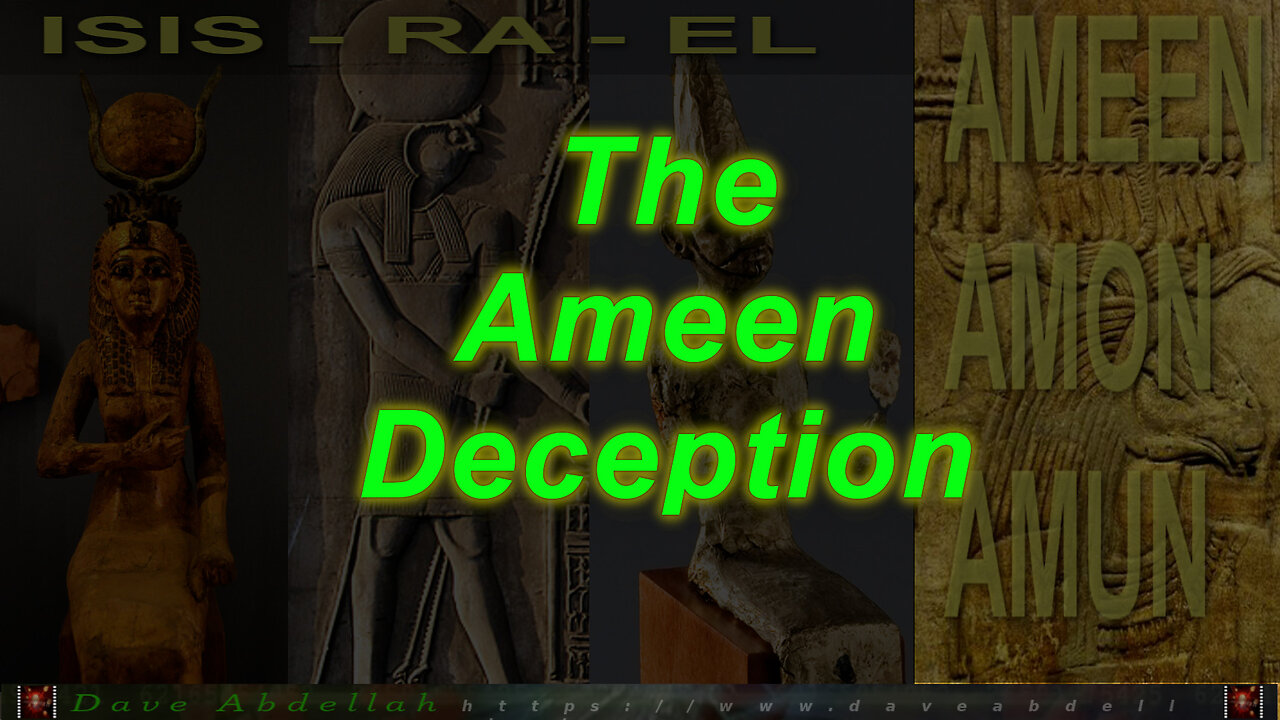Premium Only Content

The Amen Deception
Amun and Amaunet are mentioned in the Old Egyptian Pyramid Texts. The name Amun (written imn) meant something like "the hidden one" or "invisible".
Amun rose to the position of tutelary deity of Thebes after the end of the First Intermediate Period, under the 11th Dynasty. As the patron of Thebes, his spouse was Mut. In Thebes, Amun as father, Mut as mother and the Moon god Khonsu as their son formed the divine family or the "Theban Triad".
From old Egyptian texts we can see that people regarded the Sun as the emblem of the Creator. They called the Sun Ra, and all other gods and goddesses were forms of the Creator. One of these gods was Amen, a hidden and mysterious god named variously Amen, Ameen, Amon, Amun, Oman and Amun-Ra. For the first eleven dynasties (c. 3000-1987 B.C.) Amen was just a minor god, but by the 17th dynasty (c. 1500 B.C.) he had been elevated to be the national god of southern Egypt. This position gave Amen the attributes and characteristics of the most ancient gods, and his name became Amen-Ra, that is, a supreme form of God the Creator. By the 18th Dynasty (1539-1295 B.C.) a college had been established to study Amen-Ra and as a focal point for worship.
The Jews settled in Egypt for around 400 years from 1847 B.C. and during this sojourn there is no doubt they would have been fully exposed to the worship of Amen-Ra. By the time of their exodus from Egypt in 1447 B.C., Amen would certainly be in their language even if it was not their god. It would be a word that had associations with reverence and majesty. This is not difficult to understand. People still talk about Moses, Jesus, Mohammed and Buddha, and often use those names completely out of context as expletives. Amen was seen as a powerful god and the name continued, out of context, as an exclamation or salutation; a classic example of language evolution. From the Jews, the word was adopted by Christians, Muslims and others.
Buddhists and Hindus
Many Buddhists and Hindus also use Amen at the end of prayers and as concurrence in the same way as the other religions.
#daveabdellah
-
 1:43:13
1:43:13
MTNTOUGH Fitness Lab
18 hours agoMental Strength VS Physical Strength: What Elite Hunters Really Need (w/Remi Warren)
9.37K2 -
 2:27
2:27
BIG NEM
11 hours agoBalkan Trauma Explained to Africans: The Hidden Truth About Identity & History
8.93K3 -
 12:06
12:06
John Crump News
21 hours ago $0.42 earnedTwo Cases That Should Be Examined Under President Trump's Executive Order
10.5K3 -
 1:00:33
1:00:33
Trumpet Daily
19 hours ago $3.85 earnedThe Final Coup Attempt - Trumpet Daily | Feb. 11, 2025
10.8K22 -
 2:56:59
2:56:59
TimcastIRL
11 hours agoTrump Border Czar Hints He'll ARREST Leftists Aiding Illegal Immigrants w/Mark Dubowitz | Timcast IRL
238K258 -
 41:14
41:14
The White House
10 hours agoPresident Trump Greets and Welcomes Marc Fogel Back to The United States
117K58 -
 6:48:41
6:48:41
Akademiks
12 hours agoKendrick Lamar performs at the Superbowl. Does NOT LIKE US. Now projected to sell 230K! Drake done?
157K16 -
 5:12:34
5:12:34
MyronGainesX
14 hours ago $33.09 earnedChat With Pearl, Tucker vs Piers, Shopify Cancels Ye, FBI leaks ICE Raids, Trump On Jordan & Gaza!
105K32 -
 1:33:07
1:33:07
Man in America
21 hours ago🚨 Chlorine Dioxide: Banned, Censored & Feared by Big Pharma w/ Jonathan Otto
62.2K82 -
 9:21
9:21
Colion Noir
11 hours agoMan Robbed Carrying Gun In Back Pocket, Then Shot Trying To Get It Back
48.2K25